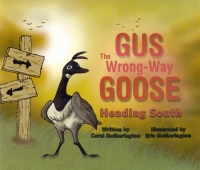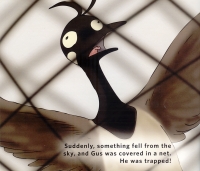| ________________
CM . . . . Volume XVIII Number 19 . . . . January 20, 2012

 |
Gus The Wrong-Way Goose Heading South.
Coral Hetherington. Illustrated by Eric Hetherington.
Winnipeg, MB: Great Leaps Publishing, 2011.
28 pp., stapled, $10.95.
ISBN 978-0-9867991-0-5.
Kindergarten-grade 5 / Ages 5-10.
Review by Charlotte Enns.
**** /4
|
| |
|

excerpt:
He looked like the other goslings. He honked like the other goslings. He hopped and swam like the other goslings. But somehow, Gus was different.
,,,
Gus began to cry as he realized the flock had left him behind.
“I’ll never find them,” he cried. “I don’t know which way to go.”
Gus the Wrong-Way Goose Heading South is an engaging story about a goose with a difference. The story incorporates information about the development and migration behaviours of Canada Geese, as well as the learning disability typically referred to as dyslexia. For the most part, the educational elements occur naturally within the story, and, therefore, the book does not come across as being overly preachy or didactic.
In particular, I appreciated the emphasis on the need for people with dyslexia to develop compensatory strategies to overcome difficulties or resolve learning situations. This provides a more realistic portrayal of how they can learn, rather than indicating that a “fix” or “cure” is required. The story also takes a strength-based view of difference by showing how Gus was the first gosling to learn to fly, despite the fact that he had difficulty knowing which way to go. The emotional toll that dyslexia can take on students is also demonstrated when Gus expresses how he feels “dumb” or inferior to the other geese. This, again, presents a realistic picture of the issues and can serve as a way to open up a discussion with young children about how they or their classmates might be feeling. This provides a more realistic portrayal of how they can learn, rather than indicating that a “fix” or “cure” is required. The story also takes a strength-based view of difference by showing how Gus was the first gosling to learn to fly, despite the fact that he had difficulty knowing which way to go. The emotional toll that dyslexia can take on students is also demonstrated when Gus expresses how he feels “dumb” or inferior to the other geese. This, again, presents a realistic picture of the issues and can serve as a way to open up a discussion with young children about how they or their classmates might be feeling.
The only negative aspect of this story is the title – I feel it is unfortunate that a deficit term was used and implies that there is something “wrong” with being dyslexic. I realize that going the “wrong-way” is different from being “wrong”, but it does have a similar negative implication.
The story was inspired by the author's youngest son, Sean, who has dyslexia, and the simple, but effective, illustrations are by the author's eldest son, Eric. Overall, Gus the Wrong-Way Goose Heading South is good story that young children will enjoy, and it has the additional benefit of providing readers with new insights about geese and about people with dyslexia.
Highly Recommended.
Charlotte Enns teaches in the Faculty of Education at the University of Manitoba, and conducts research related to literacy development of Deaf children.

To comment
on this title or this review, send mail to cm@umanitoba.ca.
Copyright © the Manitoba Library Association. Reproduction for personal
use is permitted only if this copyright notice is maintained. Any
other reproduction is prohibited without permission.
NEXT REVIEW |
TABLE OF CONTENTS FOR THIS ISSUE
- January 20, 2012.
AUTHORS |
TITLES |
MEDIA REVIEWS |
PROFILES |
BACK ISSUES |
SEARCH |
CMARCHIVE |
HOME |

 This provides a more realistic portrayal of how they can learn, rather than indicating that a “fix” or “cure” is required. The story also takes a strength-based view of difference by showing how Gus was the first gosling to learn to fly, despite the fact that he had difficulty knowing which way to go. The emotional toll that dyslexia can take on students is also demonstrated when Gus expresses how he feels “dumb” or inferior to the other geese. This, again, presents a realistic picture of the issues and can serve as a way to open up a discussion with young children about how they or their classmates might be feeling.
This provides a more realistic portrayal of how they can learn, rather than indicating that a “fix” or “cure” is required. The story also takes a strength-based view of difference by showing how Gus was the first gosling to learn to fly, despite the fact that he had difficulty knowing which way to go. The emotional toll that dyslexia can take on students is also demonstrated when Gus expresses how he feels “dumb” or inferior to the other geese. This, again, presents a realistic picture of the issues and can serve as a way to open up a discussion with young children about how they or their classmates might be feeling.